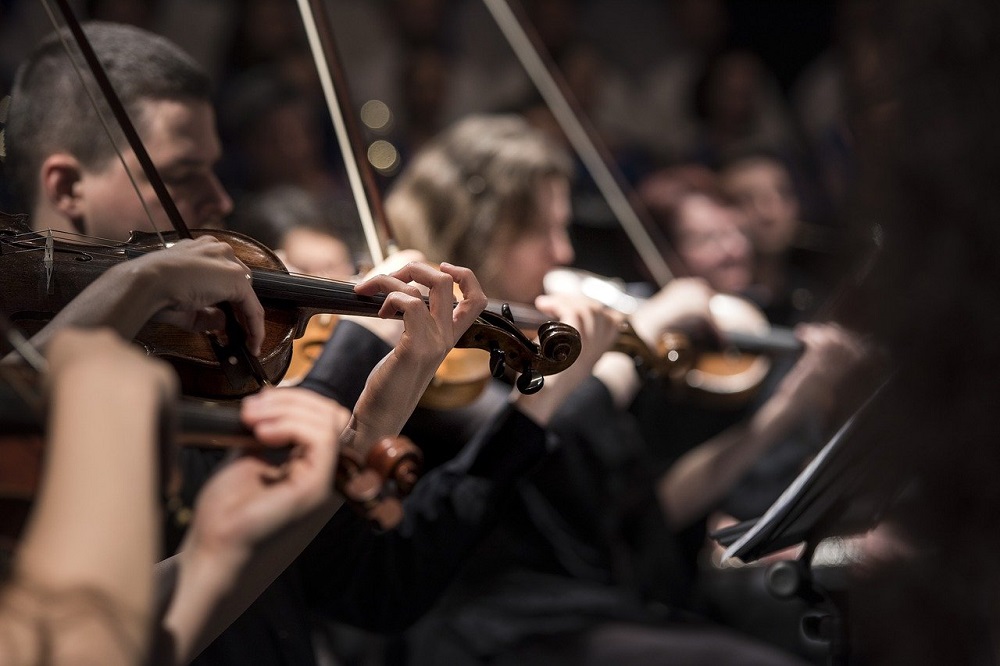Review: Sinfonia Cymru, St David’s Hall, Cardiff

Peter Collins
I have never subscribed to the Gordon Gekko mantra that “Lunch is for Wimps.” Indeed, at around 1pm on most days you are likely to find me either at my kitchen table or supping a pint in a cosy hostelry preparing to tuck into pie and chips or similar culinary delights.
So I felt a tad disconcerted, not to say wimpish, to find myself at St David’s Hall at 1pm on Tuesday moaning that I was lunchless at a lunchtime concert. But if music be the food of love, sacrificing a dish of pie and chips is no hardship, especially when the music is played by the talented and enthusiastic players of Sinfonia Cymru.
All the Sinfonia Cymru players are under 30 years of age and perform with the unbridled confidence of youth, unafraid to explore adventurous and challenging musical paths, to do things differently, and to learn from their mistakes.
All three pieces in this thoughtful programme were in minor keys. It says something about the troubled times in which we live that such young musicians should devise a programme of minor key works which at their heart were likely to be melancholy, sad and perhaps despairing.
Sadness and despair
The opening work was Croatian composer Dora Pejacevic’s Piano Quartet in D minor. Schubert, who knew a thing or two about melancholy, sadness and despair, described D minor as the key of “melancholy womanliness.” It is generally regarded as the “saddest key.”
Sinfonia Cymru saw the piece in a slightly more optimistic light, playing the opening Allegro movement with a kind of wistful charm, tempering any melancholy with bold passages of German Romanticism.
If there was any “melancholy womanliness” about the second Adagio movement it was given eloquent and lyrical expression by violinist Joy Becker and viola player Francesca Gilbert. Cellist Ben Tarlton contributed what might be called melancholy manliness to the interpretation.
The Minuet and Trio movement was a delight, while the Rondo: Allegro final movement was sprightly and energetic, dispelling any notion of sadness.
The second piece was the Phantasy [c Cor] for Piano Quartet in A minor, by Frank Bridge. The A minor key was described by German physicist and physician Hermann Von Helmholtz as “harrowing and melancholy.” There were suggestions of both in Sinfonia Cymru’s rendering of the work.
Thought provoking
Pianist Joe Howson was impressive in early passages, with playing that was both muscular and elegant. But what was most pleasing was the way the musicians worked together rather than as individuals.They were always alive to the contrasting moods of a fascinating and thought provoking work.
The concert ended with a deeply felt performance of Joaquin Turina’s Piano Quartet in A minor.
Sinfonia Cymru embraced the rather troubling brashness and exuberance of the piece which was composed shortly before the era of Franco’s fascism. This was a powerful and chillingly relevant performance, and the sense of foreboding in the closing passages sent a shiver down the spine.
Support our Nation today
For the price of a cup of coffee a month you can help us create an independent, not-for-profit, national news service for the people of Wales, by the people of Wales.





Always a joy to read a Peter Collins review. Can’t for the life of me understand why they no longer appear in the “Western Mail”.
Sounds great. Best of luck, Sinfonia Cymru. But we should not forget the Welsh Chamber Orchestra, who have carried the torch so faithfully, and survived Drakeford’s OTT lockdown, so bad for culture as for everything else.